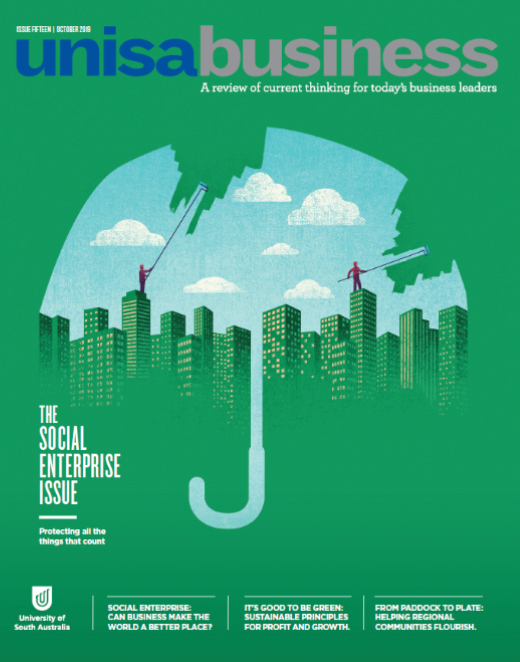MARIE WILSON
25 June 2020
WRITER: MARIE WILSON
Much has changed in the thirteen years since Muhammad Yunus and the Grameen Bank were awarded the Nobel Peace Prize for their efforts to create economic and social development from below, using micro-credit. Traditional businesses are increasingly aware not only of limiting negative impacts on their community, but also of their capacity to support and enact positive impacts on the communities in which they operate.
In this issue of unisabusiness we introduce you to Social Enterprise at UniSA, Australia’s University of Enterprise. We profile the work of UniSA researchers, including Associate Professor Tony Cavoli and his colleagues who demonstrate the importance of financial inclusion, as well as Associate Professor Svetlana Bogomolova’s review of community-oriented business models that benefit our regions, using marketing science to target health and social outcomes.
We know you’ll be inspired by the work of Professor Henning Bjornlund, that reaches out to conquer drought, poverty and disease in inspiring agricultural water management projects in Africa. Part of UniSA Business School’s international reputation and social impact is driven by our world-leading research group in Water Economics and Policy, led by Professor Lin Crase.
We bridge social innovations in care, with our interview of Gerrie Mitra who led the transformation of youth social support in the formation of an employee mutual to deliver services under NDIS. Hear also
from the CEO Carclew Creative, supporting young creative entrepreneurs to build skills and sustainable careers. Peter Sandeman and Ian Goodwin-Smith will profile their own passion for purpose, and introduce you to The Australian Alliance for Social Enterprise (TAASE), an action research initiative for health and social care development, supported by Anglicare and many other healthcare and social service organizations,
with UniSA Business School.
We have moved well beyond corporate beneficence and social responsibility to an increasing number of organizations in the purpose economy (Hurst, 2014), where social good motivates not only the enterprise, but the employees within it. Social enterprise ranges from charities seeking to increase the amount of people who benefit from the good work that they do by developing more commercially viable business models, to social innovations that reinvent the way we care for one another, to ‘for benefit’ corporations that invest in social innovation and sustainability in their value chains, while investing in development projects rather than profit-sharing.
This month we launch the Social Enterprise Hub at UniSA, bringing together the expertise in social innovation and social entrepreneurship across the University, highlighting international student case competitions in social enterprise, the Yunus Social Business Centre, as well as over twenty projects across the University that enable new models of service and enterprise that transform lives and create social impact.
Enjoy this jam-packed issue and join us online through the Social Enterprise Hub for more updates
on our work, and opportunities to engage in this area.
Additional reading: Aaron Hurst, The Purpose Economy: How Your Desire for Impact Personal Growth and Community Is Changing the World, Elevate Publishing, 2014. Muhammad Yunus, A World of Three Zeros: The New Economics of Zero Poverty, Zero Unemployment, and Zero Net Carbon Emissions. Public Affairs Publishing, 2018.


